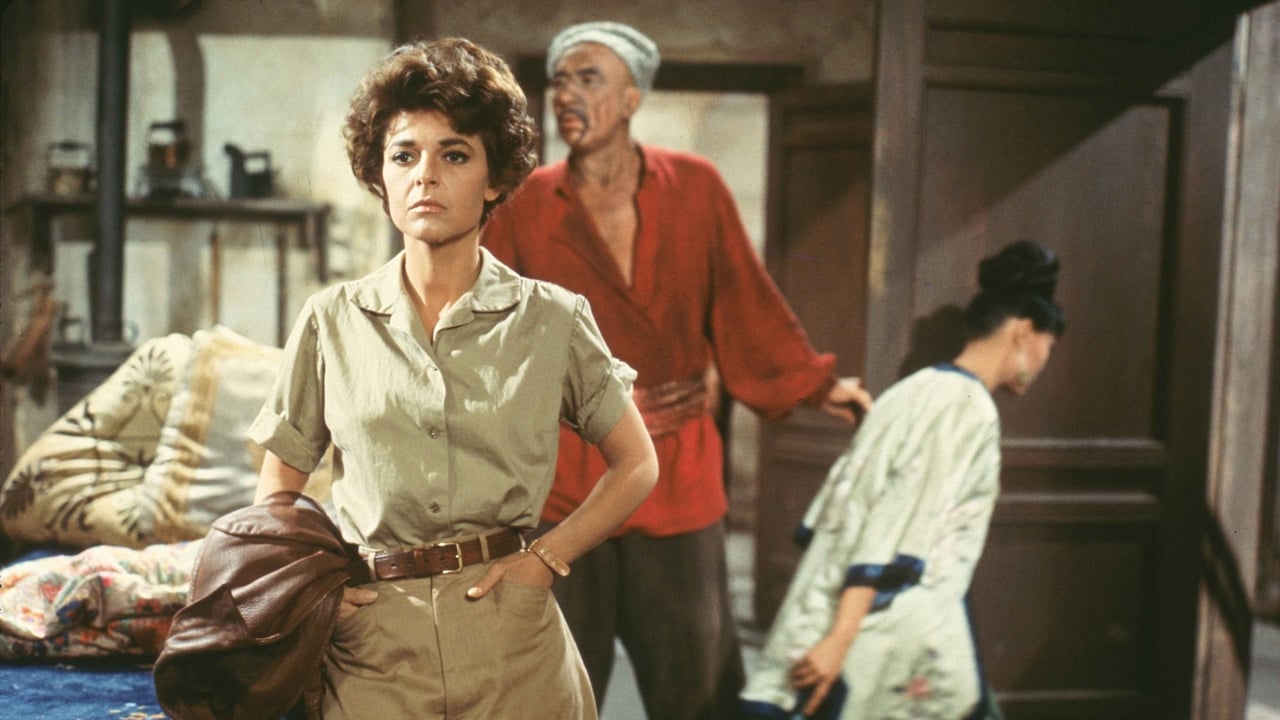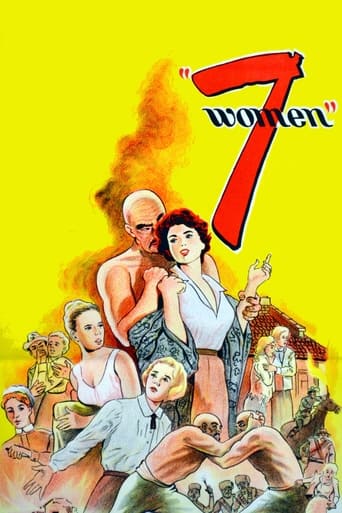Chirphymium
It's entirely possible that sending the audience out feeling lousy was intentional
Fairaher
The film makes a home in your brain and the only cure is to see it again.
StyleSk8r
At first rather annoying in its heavy emphasis on reenactments, this movie ultimately proves fascinating, simply because the complicated, highly dramatic tale it tells still almost defies belief.
Bea Swanson
This film is so real. It treats its characters with so much care and sensitivity.
Michael_Elliott
7 Women (1966) *** (out of 4) John Ford's final film is one you really wouldn't expect to see from him but I guess it goes to show what a great director he was as he could end his nearly fifty-year career with something fresh and original. The film takes place in 1935 China as a free-wheeling and free-spirited doctor (Anne Bancroft) comes to work at a missionary where she immediately clashes with the head of the mission (Margaret Leighton). The head doesn't agree with the doctor's way of life, which includes smoking, drinking, profane language and of course not believing in God. Soon the doctor is battling this but then a plague breaks out in the mission and then they come under attack from some rebels. I'm not sure if stunned is too strong of a word but that's what my feelings were going through this film. I've seen at least fifty John Ford movies and I never thought I'd see something like this one. The attitude of the Bancroft character just seems like something the director would stay away from and the anti-religion stance was so strong that again I couldn't believe this was something from Ford. I think if you showed this movie to the biggest of film buffs and didn't tell them who the director was I doubt they'd ever guess it was someone like Ford. I really appreciated the 60s fling thrown into the picture because you can obviously tell that they were taking a 60s woman and putting her into this situation. There's a bit about the doctor leaving America because a woman couldn't get a fair shake at a good career and again I wonder if they were standing up for women's rights. The film also has bits of lesbianism, the religious hypocrites and a strong sense of sexuality. The movie certainly isn't ahead of its time considering this was 1966 but it's still impressive stuff. Bancroft is downright marvelous here and turns in a very memorable performance. I must admit that I fell in love with her character as you have to respect the toughness that the actress brings to the role. I believed every second of it and there's just a certain fire to Bancroft that clearly shows up on the screen. Leighton is one of those love-to-hate performances and makes for a great villain. Sue Lyon, best known from Kubrick's LOLITA, turns in a fine performance. We even get Woody Strode in a small role as one of the warriors. The film's pacing is a very slow one and it feels like the movie is a lot longer than its 86-minute running time but this isn't a negative thing as I never got bored. I was certainly surprised to see how much Ford managed to cram into the short running time. His direction here contains some of his softest touches but they all work. It's a shame this movie isn't mentioned more when people discuss his career but it's certainly a good and original way for him to go out.
didi-5
'7 Women' is the story of Dr Cartwright, who dresses like a man, smokes, drinks, and swears like a trooper, and what happens when she arrives at a mission deep in a zone touched by revolution. The doctor is played by Anne Bancroft, and it probably is her best role. She's an atheist with humanity - when she eventually gives herself and her life to save everyone else in the mission from a fate worse than death, it isn't unexpected, although the women of God lose their strength and resolve in the face of fear.Well supported by cast members like Margaret Leighton, Sue Lyon, Flora Robson, and Anna Lee, this film, a John Ford film which is still a western in its spirit like the great entries in his oeuvre. Good strong storytelling with believable characters make '7 Women' unmissable.
bjorn bennike
Seven women was John Fords last- and one of his very best color movies. Strange and beautiful - about the fate of a group of women - during the boxer rebellion in China hundred years ago. It was a kind of a swansong (1966) for him - and he was very happy (and proud) about it - but its characters might be to strange and challenging for many movie lookers?? It is at least very underrated! I hope it will change in the future, so we can buy it on DVD. The acting and all situations in the movie are appealing and absolutely astonishing!!Quotes from the review in New York Times May 5, 1966:"Imagine a bunch of isolated, pristine mission ladies captured by bloodthirsty Mongolian bandits—this, mind you, under the great director, John Ford. Add a heady, female bevy of players like Margaret Leighton, Flora Robson, Mildred Dunnock, Betty Field and, emphatically, Anne Bancroft in the role begun by the stricken Patricia Neal...Mr. Ford's picture, which gets off to a graphic, arresting start (with some ripe Elmer Bernstein music) tapers off to a stark, bony melodrama of female hysteria and mayhem...And Mr. Ford has gotten professional performances, in the main, from his tense, but transparent study of violence besetting an American mission in 1935. But the story edges to a grim, foregone conclusion, underscored by nagging, neurotic yowling, led by Miss Leighton and Miss Field...What steadies the film and almost severs it, in fact, is a sizzling, earthy performance by Miss Bancroft, as a profane hard-bitten doctor whose arrival tilts the mission even before the barbarians roar into view. Miss Bancroft, a little mannered heretofore, is simply wonderful, from her first bleak appraisal of the premises to the obvious, tragic fadeout, by which time the mission seems like an Oriental East Lynne..."
zetes
John Ford's swan song is very underrated. Anne Bancroft plays a chain-smoking doctor who has fled the United States (for reasons unknown, unless they were explained during the minute or so I was away to answer the phone) to work at a mission in China. Margaret Leighton plays the head of this mission, a devout Christian who controls her underlings with strict rules. Various troubles ensue, the most prominent being the threat of a cholera epidemic, a raid by Mongolian bandits, and a pregnant woman who is nearing menopause, which makes the birth a very difficult situation. It is the second problem which I mention that takes up most of the plot. The mission has heard stories of these Mongolians in the nearby areas. Leighton is sure that they will never dare attack her mission, by the grace of God and America. But they do, and they keep all the white women hostage after killing off every Chinese person in sight. They believe that they can win a ransom for them. The tough Bancroft bravely opposes them, but she can make no headway by those means. Instead, the leader of the bandits demands sex. In this way, she is able to influence the way the women are treated (especially concerning the birth). The main conflict of the film is between Leighton and Bancroft. It's very 60s, with the progressive, liberated woman fighting against the strict, sexless one. The role of religion is very interesting in the film. It's shocking that Ford, a devout Catholic, would make the headmistress so foolish. It's a very intelligent criticism of the holier-than-thou attitude of some. When death looks imminent, Leighton seems almost excited to become a martyr; and she's willing and ready to take everyone else with her. When Bancroft sees her chance to save the others, Leighton viciously attacks her for being the "whore of Babylon." The final scene is quite excellent. What a great way for the greatest director of all time end his career.

